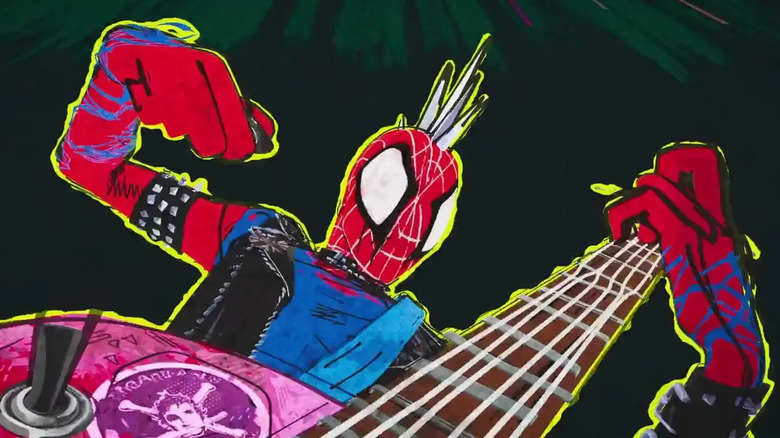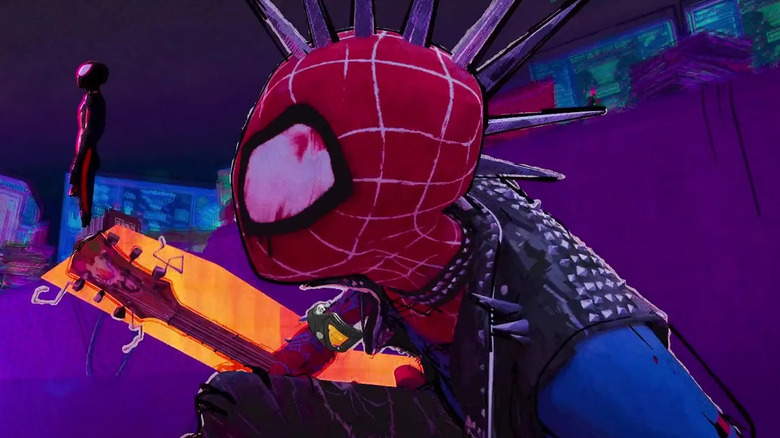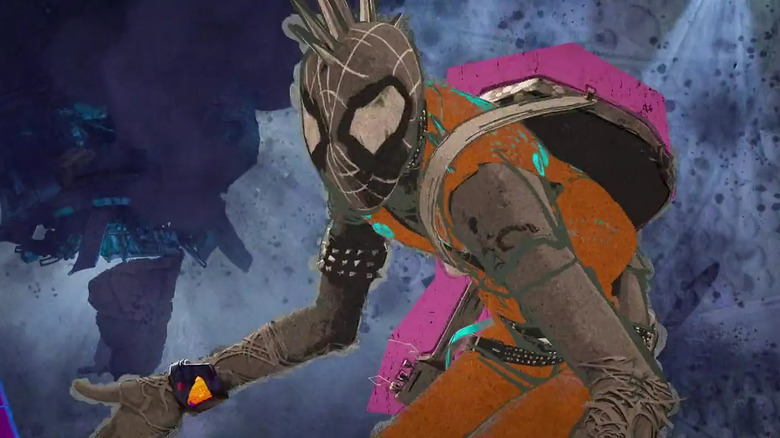How Sony's Spider-Punk Movie Could Best Marvel Studios At Their Own Game
In the dimension-hopping "Spider-Man: Across the Spider-Verse," the mild-mannered Miles Morales (Shameik Moore) once again finds himself skipping between parallel universes. His inter-dimensional would-be girlfriend Gwen Stacy (Hailee Steinfeld), a.k.a. Spider-Woman, has alerted Miles to the existence of the Spider-Society, a massive cadre of hundreds of Spider-People, all gathered together from their respective parallel universes. Like in "Spider-Man: Into the Spider-Verse," Miles meets unusual variants of himself, including the cold-hearted Spider-Man 2099 (Oscar Isaac), the broody Scarlet Spider (Andy Samberg), the excitable Spider-Man India (Karan Soni), and Jessica Drew, another Spider-Woman (Issa Rae).
Miles also meets the ultra-cool Spider-Punk, a black-vest-and-mohawk-sporting Spider-Man who is animated to look like a moving crumpled-up punk band flier. Spider-Punk is played by Daniel Kaluuya, and he beats people up with his electric guitar. Miles thinks that Spider-Punk is one of the coolest people he's ever met ... and he's not wrong. The character is pretty badass.
"Across the Spider-Verse" ends on a cliffhanger, leaving it frustratingly incomplete until the third "Spider-Verse" movie, "Spider-Man: Beyond the Spider-Verse," arrives. Now, it appears we may also be getting another dose of Spider-Verse in the form of an animated Spider-Punk feature film. As reported by Deadline, the movie is currently being developed by Sony, with Kaluuya working on the script alongside Ajon Singh (who also wrote the upcoming A24 Robert Pattinson vehicle "Primetime"). It's also probably safe to assume that Kaluuya will return to play the Spider-Punk character, assuming the film continues to move forward.
A Spider-Punk movie — like the "Spider-Verse" films before it — should also prove how easy and exciting multiverse stories can be. Marvel Studios has been telling multiverse stories for years now, but has so far been a little clumsy with the concept. "Spider-Punk," on the other hand, could prove that all the parallel universe versions of a pop culture icon can easily interact, while still appearing in exciting stories of their own.
The Marvel Cinematic Universe has used the multiverse in a clumsy way
The Marvel Cinematic Universe, of course, began with "Iron Man" and "The Incredible Hulk" in 2008, but it wasn't brought into full swing until Disney purchased Marvel in 2009. After that, the Mouse House and Marvel Studios began making movies about individual Avengers characters with the express intent of having them all cross over in a gigantic mega-blockbuster. Their formula proved to be overwhelmingly popular, and the MCU became the dominant pop culture phenomenon of the 2010s. Disney, however, didn't have legal access to several of Marvel's more popular characters in 2009, including Spider-Man (owned by Sony), the Fantastic Four, and the X-Men (the latter pair of which were owned by Fox). As such, the MCU had to evolve without Marvel's biggest stars.
Disney made a deal with Sony, however, and brought Spider-Man into the MCU starting with 2016's "Captain America: Civil War." After that, Disney bought Fox and finalized its acquisition in 2019, allowing the X-Men and Fantastic Four to be integrated into the MCU as well. Naturally, MCU fans were eager to see how these characters would be incorporated into the franchise, and some assumed it would be via dimensional portals. The X-Men were too complicated to start up in the midst of the MCU, but one could imagine them appearing, fully-formed and wholly established, from a parallel universe, eager to join the Avengers in their merry misadventures.
But Marvel Studios head Kevin Feige and, by extension, the MCU has been clumsy in using the multiverse. Skipping between parallel dimensions was a big part of the TV series "Loki" and the central conceit of "Doctor Strange in the Multiverse of Madness," yet star Marvel characters have often been relegated to cameos and throw-away gags. Indeed, the cameo-laden films "Spider-Man: No Way Home" and "Deadpool & Wolverine" have assembled disparate Marvel characters in the same parallel world ... only for nostalgia. They're not bold new visions about incorporating new characters into an expanding universe, they're "victory laps" that starred familiar actors re-playing famous superhero roles. "No Way Home" and "Deadpool & Wolverine" were huge box office hits, but they weren't very expansive.
Spider-Punk is part of a multiverse audiences actually care about
It's worth noting that the MCU did try to create a complex multiverse arc centered on a genocidal villain named Kang (Jonathan Majors), but that story ran into legal problems when Majors was legally found guilty of harassment and assault (leading Marvel to fire him). Even before that, though, the MCU's Multiverse Saga — as it's been dubbed — was mishandled and awkward. For example, rather than introducing the multiverse in the immediate wake of the Infinity Saga's conclusion, the MCU waited until "Ant-Man and the Wasp: Quantumania" — several films and Disney+ shows later — to fully set up Kang as its next big bad. By then, however, so much time had passed that the MCU no longer felt unified. And now, with the Kang arc having been abandoned for one involving Doctor Doom (Robert Downey Jr.) in the still-being-written "Avengers: Doomsday," a palpable multiverse story has yet to emerge across the MCU in a way that's gotten audiences excited.
A "Spider-Punk" movie, by comparison, would be an organic way to explore a multiverse that people care about. The "Spider-Verse" films haven't been coy about their multiverse, stating clearly that there are many superhero universes, including countless renditions of Spider-Man, and easy ways for them to interact. Indeed, the visual ingenuity of the "Spider-Verse" movie series is its central selling point, allowing animators to invent vibrant and creative worlds for every single version of Spider-Man. They're also not afraid to get silly with it; did you spot Peter Parked-Car, the version of Spider-Man ... who is a car?
Spider-Punk is a cool version of Spider-Man that only needed a brief intro, including a small declaration of his anti-establishment ethos, to affirm that he's one of the coolest guys who's ever lived. Thus, a "Spider-Punk" film would be the natural outcropping of a multiverse movie that fans could get behind. Unlike the MCU, the "Spider-Verse" films are not slow-walking their big stars, nor are they reliant on nostalgia. Instead, they're exploring their cool-ass characters organically. Next, there could be a Spider-Man India movie or a film about Spider-Man 2099 (and so forth). The multiverse, as a concept, works fine. The MCU has just flubbed it.
"Spider-Man: Beyond the Spider-Verse" is scheduled to open in theaters on June 25, 2027.


